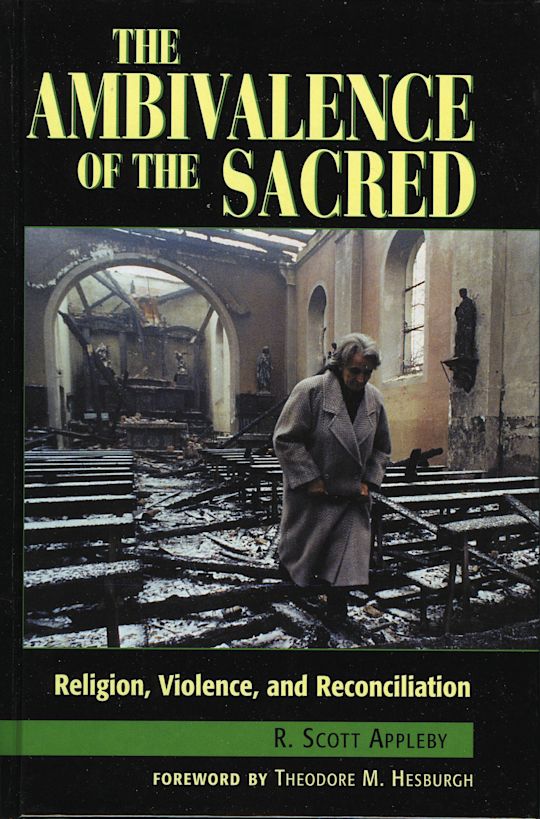- Home
- ACADEMIC
- Politics & International Relations
- Introduction to International Relations
- The Ambivalence of the Sacred
The Ambivalence of the Sacred
Religion, Violence, and Reconciliation
- Textbook
The Ambivalence of the Sacred
Religion, Violence, and Reconciliation
- Textbook
Exam copy added to basket
Choose your preferred format. Please note ebook exam copies are fulfilled by VitalSource™.
Buy from Bloomsbury eTextBooks
You are now leaving the Bloomsbury Publishing website. Your eBook purchase will be with our partner https://www.vitalsource.com.
Your credit card statement will show this purchase originating from VitalSource Technologies. They will also provide any technical assistance you might require.
You must sign in to add this item to your wishlist. Please sign in or create an account
Description
Terrorists and peacemakers may grow up in the same community and adhere to the same religious tradition. The killing carried out by one and the reconciliation fostered by the other indicate the range of dramatic and contradictory responses to human suffering by religious actors. Yet religion's ability to inspire violence is intimately related to its equally impressive power as a force for peace, especially in the growing number of conflicts around the world that involve religious claims and religiously inspired combatants. This book explains what religious terrorists and religious peacemakers share in common, what causes them to take different paths in fighting injustice, and how a deeper understanding of religious extremism can and must be integrated more effectively into our thinking about tribal, regional, and international conflict.
Table of Contents
Chapter 2 The Unfolding Response to the Sacred
Chapter 3 Religion's Violent Accomplices
Chapter 4 Violence as a Sacred Duty
Chapter 5 Militants for Peace
Chapter 6 Reconciliation and the Politics of Forgiveness
Chapter 7 Religion and Conflict Transformation
Chapter 8 Religious Human Rights and Interreligious Peace Building
Chapter 9 Ambivalence as Opportunity
Product details
| Published | Nov 23 1999 |
|---|---|
| Format | Ebook (PDF) |
| Edition | 1st |
| Extent | 448 |
| ISBN | 9798765178065 |
| Imprint | Rowman & Littlefield Publishers |
| Series | Carnegie Commission on Preventing Deadly Conflict |
| Publisher | Bloomsbury Publishing |
About the contributors
Reviews
-
Scott Appleby's book provides a timely, clear, and highly perceptive treatment of why and how religion has, especially since the end of the Cold War, gravitated to the center of the discussion of international affairs. . . . There is no doubt that this volume will be the centerpiece henceforward of an important new discussion on 'religion, violence, and reconciliation.'
David Little, United States Institute of Peace
-
In this volume [Appleby] seeks to balance the overall picture by focusing on the success stories and peacebuilding initiatives buried inside the newspapers, embedded in a largely untold past, and emerging piecemeal in the final years of this genocidal century. This is a kind of compensatory history, urgently needed in the contemporary debate, and it carries enormous implications for the way we think about religion's complex role, and undeniable potential, in preventing deadly conflict and in rebuilding communities shattered by violence.
Theodore M. Hesburgh
-
I have found myself deeply impressed by the persuasiveness of its argument and by the wide-ranging case studies it contains. I can here only hint at the rich and varied resourses he provides in abundance to enable us to be both more faithful interpreters of our own traditions and to be more strategic in our peacemaking.
Paul Deats, Fellowship
-
Appleby is extremely knowledgeable about movements, conflicts and personalities. Ambivalence of the Sacred contains rich veins of information about the complex relationship of religion, violence and peacemaking. It provides dozens of detailed portraits of personalities and religious movements that put faces on anonymous groups.
America: The Jesuit Review of Faith & Culture
-
In this current important book-not limited to conservative movements- Appleby uses case studies, careful analysis, and a highly readable narrative style to present religion's role in contemporary peacemaking and warmaking.
Choice Reviews
-
Appleby's book should be required reading for all academic specialists in international relations and for practitioners of diplomacy as well. It provides a careful study of the interaction of religion with political life in many parts of the world today. It does this with a strong understanding of the differences and similarities among the major world religions and among the different civilizational contexts within which these religions function. . . . There is nothing quite like it for presenting the plusses and minuses of the role of religion on the world stage today.
David Hollenbach S.J., Pedro Arrupe Distinguished Professor,Georgetown University



































